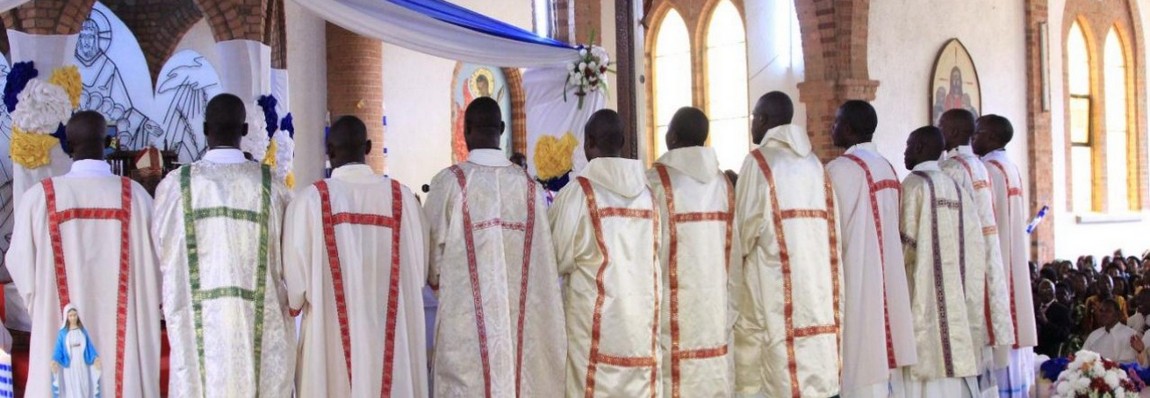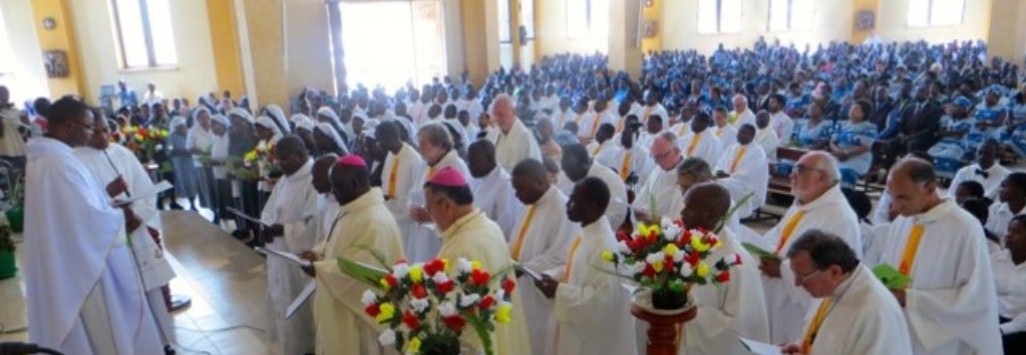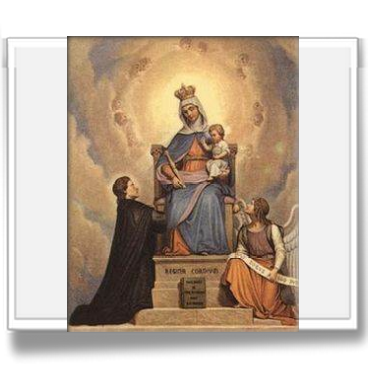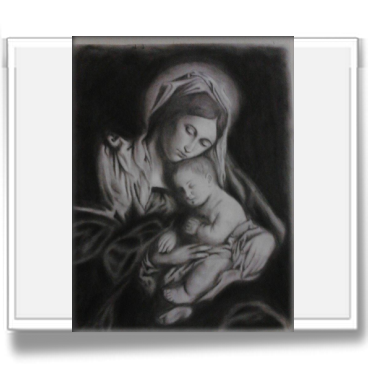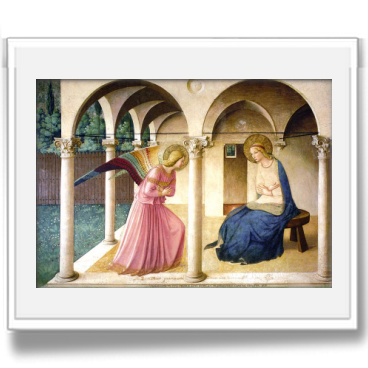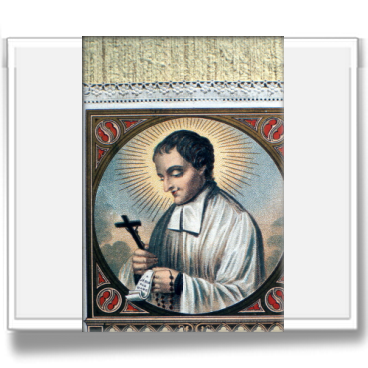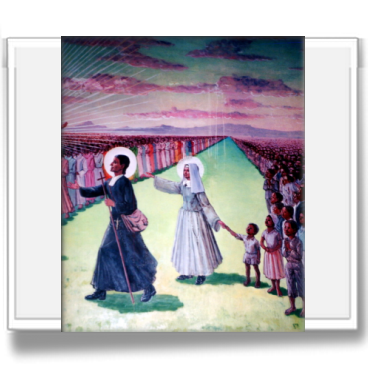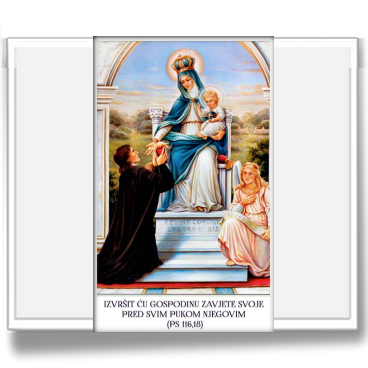Spirituality
The Spirituality of St. Louis Marie de Montfort
St Louis Marie de Montfort, “the Father with a big Rosary” is mostly for his devotion to our Blessed Lady. However, his particular spirituality is founded on the mystery of the Incarnation of Jesus Christ, and is truly Christocentric. It is a mistake to see it as a purely "Marian" spirituality. What follows is an overview, taken from the Introduction to "God Alone: The Collected Writings of St Louis Marie de Montfort", available from Montfort Press. For all his writings refer to http://www.montfortian.info/writings/the-love-of-eternal-wisdom.html
An Overview of the Spirituality of St. Louis Marie de Montfort
Many sources contributed to Saint Louis de Montfort's experience of the Incarnate Wisdom of the Father. His family background, his education, his daily prayerful study of the Bible, the diversity of his readings, his missionary travels, all play a major role in his understanding and expression of the faith. Moreover, he absorbed freely the spirit of the writings and teachings of the Jesuits, Dominicans, Sulpicians, Oratorians, the Hermits of Mont Valerien in Paris and other communities of men. He also had close ties with the Visitation Order, the Benedictine Nuns. From the viewpoint of the variety and diversity of his sources, Montfort's spirituality can be called eclectic. Nonetheless, basing himself primarily upon the French School of spirituality so strongly influenced by Cardinal de Bérulle, this itinerant herald of the Good News wove these various strands into a new synthesis which can be rightfully called the Montfortian School of spirituality.
The core of this spirituality is the reality of our baptismal insertion into Christ Jesus. So fundamental is this principal thrust of Montfort's thought that he can firmly declare that his preaching "cannot be condemned without overturning the foundations of Christianity" (The True Devotion, 163). His Holiness, Pope John Paul II repeats this thought when he says: "Grignion de Montfort introduces us into the very heart of the mysteries on which our faith lives, grows and bears fruit."
Yet our Baptism into Christ, the Eternal and Incarnate Wisdom of the Father, is not understood in an abstract fashion by this popular and practical preacher. Since we are one in Christ Jesus, we are to trust totally in Divine Providence, we are to imitate the Lord who "emptied himself, taking the form of a slave" (Phil. 2:7). Montfort's teachings abound with the insistence on poverty of spirit, the living to the hilt of the first beatitude, "Blest are the poor in spirit, the Kingdom of heaven is theirs" (Mt 5:3). His writings call, therefore, for a loving, formal acceptance of who we truly are: the slaves of Jesus Christ. The term slave always has, for Montfort, the evangelical connotation that we are the Lord's, that we are loved, that we are redeemed by the Incarnation and total offering of the Incarnate Wisdom for us. The characteristic then of Montfort's stress on baptismal renewal is "absolute," total. Following the counsel of Pope Clement XI, the vagabond missionary proclaims the renewal of the vows of our baptism, invigorating the Church wherever he preaches.
There is, however, an intrinsic dimension of this baptismal renewal proclaimed by Saint Louis de Montfort. Through baptism we share in the life of the Incarnate Wisdom; but Wisdom seeks a home among us through the consent of a woman of our race, the Immaculate Mary. According to Wisdom's mysterious plan -- folly in the eyes of the world -- the faith-consent of Mary opens the gates of this sinful universe to the King of Glory. Her representative Yes to the redemptive Incarnation is for Montfort an intrinsic element of salvation history as it is actually planned by God. It is not only part of the "beginning" -- the Incarnation -- but the never-to-be-repealed plan of The Triune God in all His works. Karl Rahner appears to echo this thought of Saint Louis de Montfort when he writes: "The absolutely unique Yes of consent of the Blessed Virgin, which cooperated in determining the whole history of the world, is not a mere happening that has disappeared into the void of the past ... She still utters her eternal Amen, her eternal Fiat ..." Devotion to Mary, says Pope Paul VI in Marialis Cultus must be based on firm doctrinal foundations. Montfort calls for solid devotion to Mary because of the evangelical doctrine of her divinely-willed role of representative faith in the redemptive Incarnation and all that flows from it. To be inserted by Baptism into the Eternal and Incarnate Wisdom, has a necessary Marian dimension. Jesus is everywhere and forever the Son of Mary, the spokesperson for this universe in actively and responsibly accepting Wisdom's desire to enter into our folly so that we may share in Wisdom.
Montfort's intense devotion to Mary is clearly Christocentric. So strongly does the saint insist upon this point that he forcefully teaches that if devotion to Mary alienated us from Jesus it would have to be rejected as a diabolical temptation (cf. The True Devotion, 62). With Mary we enter into a more intense and more immediate union with Incarnate Wisdom. To wrench Mary from salvation history and therefore from Christian life is, for Montfort, to reject the plan of salvation as decreed by the Father.
The total, lived-out acceptance of the reality of our faith is what Monlfort calls "Consecration to the Eternal and Incarnate Wisdom." This loving, free surrender to God's plan renews us in the Spirit so that we may "carry out great things for God and for the salvation of souls" (cf. The True Devotion, 214). His spirituality, founded upon the reality of the redemptive Incarnation and of our insertion into it by Baptism, is eminently apostolic, is essentially missionary. As Wisdom enters into our poverty through Mary's faith, so we must live poverty of spirit as we serve the outcasts of society. And all must be done in the "milieu" of Mary's maternal influence so that we may, like her, be temples of the Holy Spirit and thereby renew the face of the earth.
Living our baptism in the fullest sense of its evangelical meaning, Montfort concludes that all must be done for God Alone. Everything which opposes God, all the idols of this world are for this vagabond missionary to be destroyed by the onmipotence of our faith in Christ Jesus. "To know Jesus Christ the Eternal and Incarnate Wisdom is to know enough; to know everything and not to know Him, is to know nothing." The missionary's Spirit-filled preaching emphasized the basic opposition between God's Wisdom and the distorted value systems of this world, no matter where they may be found, even if it be within the Christian community itself. He rivets our attention on the precise enemy: making ourselves the center, proudly believing that without God Alone this world can be transformed. No wonder that this vagabond of the Lord begged God for a community of missionaries who would be a "body-guard of hand picked men to protect his House ..." No wonder that his battle-cry and the one he gave to his religious communities was the simple yet powerful: GOD ALONE!
It is to the glory of this missionary that he is a man of his time, a preacher for the people of his age. It is, of course, in the language and thought patterns of his age, through baroque expressions of the preacher-mystic, of the active-contemplative, that Montfort surfaces what for so many is at best implicit: we are all the evangelical slaves of Jesus in Mary. There are, therefore, expressions and thought-patterns of this saint which must be updated in accord with the on-going experience of the christian community. Verbal fidelity to the teachings of Montfort could lead to a distortion of their true meaning.
The term 'slave', for example, though definitely scriptural, can in many cultures be so misunderstood that its use would distort Montfort's message. Although it is truly surprising how the saint's Christocentric and ecclesial Mariology dovetails with the thought of the Second Vatican Council and with Marialis Cultus, nonetheless, fidelity to the Montfortian charism itself demands that his writings always be read in the light of the present insights and expressions of the Church.
Yet, in conclusion, it must be said that the spirituality of Saint Louis de Montfort -- the reform of the Church through a new, lived-out affirmation of our baptism into Christ whereby we willingly and fully accept who we are, the loving slaves of Jesus in Mary -- is the Good News itself. Moreover, other aspects of Montfortian spirituality which spring from this "baptismal core," especially his charismatic, bold proclamation of the Gospel, his effective love for the poor and oppressed, his joyful trust in Divine Providence, his stress on the Holy Spirit, his practical recognition of Mary's spiritual maternity, a deeply contemplative-active life, all these surely touch a sensitive nerve in today's christians. His life and spirituality appear to be even more relevant today than they have been in the past.
Montfort's Spirituality and Marian Devotion
St. Louis Marie de Montfort is best known for his promotion of a particular form of devotion to the Blessed Virgin Mary, known variously as "The Holy Slavery of Jesus in Mary", "Total Consecration to Jesus through Mary", or simply "True Devotion to Mary" (from the title of his best-known book, "Treatise on True Devotion to the Blessed Virgin Mary").
However, just as it is a mistake to suppose that the Roman Catholic Church places devotion to Mary above commitment to Christ, so it is equally mistaken to think that St. Louis Marie's spirituality is exclusively, or above all, "Marian" (concerned with Mary, the Mother of Jesus). As he says himself (in "Treatise on True devotion to the Blessed Virgin Mary", no. 61): Jesus, our Saviour, true God and true man must be the ultimate end of all our other devotions; otherwise they would be false and misleading;
and (in no. 62):
If then we are establishing sound devotion to our Blessed Lady, it is only in order to establish devotion to our Lord more perfectly, by providing a smooth but certain way of reaching Jesus Christ. If devotion to our Lady distracted us from our Lord, we would have to reject it as an illusion of the devil.
For further Montfortian Spirituality resources click: http://www.montfortusa.org/MontfortUSA/Montforts_Spirituality.html
The words "a smooth but certain way of reaching Jesus Christ" indicate clearly the place of Marian devotion in St Louis Marie's view of Christian spirituality: it is a means to an end, not an end in itself. The end in view is commitment to Jesus Christ. Genuine (or "sound" or "true") devotion to Mary is, however, "a smooth and certain way" to this end.
This is stated even more clearly in "The Love of Eternal Wisdom", one of the earliest of St. Louis Marie's writings, in which his concern for devotion to Mary is placed clearly in the context of his prime concern, which is relationship to Jesus Christ, whom he sees as the personification of "the Eternal and Incarnate Wisdom of God". It is only at the end of this book that he describes the four principal means of arriving at a knowledge and love of Jesus, "Eternal Wisdom":
- Ardent desire
- Constant prayer
- "Universal" mortification
- Genuine devotion to Mary
Of this fourth means, he says (LEW 203):
The greatest means of all, and the most wonderful of all secrets for obtaining and preserving divine Wisdom is a loving and genuine devotion to the Blessed Virgin.
St. Louis Marie de Montfort does offer a new and precious insight into the most effective form of devotion to Mary (Total Consecration to Jesus through Mary), but it should also be recognised that he offers equally precious insights into our relationship with Jesus Christ, especially in his "Wisdom spirituality".
Consecration to the Eternal and Incarnate Wisdom
Mary, Queen of all HeartsMontfort calls for a total consecration to Jesus Christ, the Eternal and Incarnate Wisdom, through the hands of Mary. This practice of Christian devotion is at the heart of the response which St. Louis Marie de Montfort recommends when we consider the love shown to mankind by God. It has also been variously called "The Holy Slavery" and "True Devotion" (from the name of the book, Treatise on True Devotion to the Blessed Virgin, in which St. Louis Marie describes it most thoroughly) - but it should be noted that when he speaks of "true" devotion, he is not picking out just one form of devotion, but intends to speak of "genuine" devotion in its many forms.
Descriptions in the writings of St. Louis Marie
We find several descriptions of this practice in various books written by St. Louis Marie, for example:
The Love of Eternal Wisdom, no. 219: "The most perfect and most profitable of all devotions to the Blessed Virgin consists in consecrating ourselves entirely to her, and to Jesus through her, as their slaves. It involves consecrating to her completely and for all eternity our body and soul, our possessions both spiritual and material, the atoning value and the merits of our good actions and our right to dispose of them. In short, it involves the offering of all we have acquired in the past, all we actually possess at the moment, and all we will acquire in the future."
Treatise on True Devotion to the Blessed Virgin, no. 121: "This devotion consists in giving oneself entirely to Mary in order to belong entirely to Jesus through her. It requires us to give:
Our body with its senses and members;
Our soul with its faculties;
Our present material possessions and all we shall acquire in the future;
Our interior and spiritual possessions, that is, our merits, virtues and good actions of the past, the present and the future."
The Secret of Mary, no. 28: "This devotion consists in surrendering oneself in the manner of a slave to Mary, and to Jesus through her, and then performing all our actions with Mary, in Mary, through Mary, and for Mary."
From these quotations, certain things immediately stand out:
It is a "consecration" ("surrendering") of oneself to Jesus through Mary, not simply to Mary;
it is a "total" consecration - of all that we are and all that we have;
it involves the past and the future as well as the present moment - therefore it is not just a momentary action.
However, it is not enough to take a simple description of this practice. St. Louis Marie himself spent much time and effort to prepare people's minds for it, and to draw out its consequences and its benefits. And he recognised that different people would have different reactions to it, and would put it into practice at different levels:
"As this devotion essentially consists in a state of soul, it will not be understood in the same way by everyone. Some - the great majority - will stop short at the threshold and go no further. Others - not many - will take but one step into its interior. Who will take a second step? Who will take a third? Finally who will remain in it permanently? Only the one to whom the Spirit of Jesus reveals the secret. The Holy Spirit himself will lead this faithful soul from strength to strength, from grace to grace, from light to light, until at length he attains transformation into Jesus in the fullness of his age on earth and of his glory in heaven." (Treatise on True Devotion to the Blessed Virgin, 119)
The formula drawn up by St Louis Marie himself for this Total Consecration to Jesus through Mary is available for download
Living Total Consecration
It is one thing to make an "Act of Consecration" to Jesus through Mary; but it is another thing entirely to live out that consecration. And it must be lived out, otherwise it is not a true "consecration". A consecration implies that we dedicate ourselves totally to the service of God, and so it demands that the whole of our life, and every aspect of it, should be affected by that dedication. St Louis Marie de Montfort recognised that this is a difficult thing to achieve; he said:
It is not enough to give ourselves just once as a slave to Jesus through Mary; nor is it enough to renew that consecration once a month or once a week. That alone would make it just a passing devotion and would not raise the soul to the level of holiness which it is capable of reaching. It is easy to enroll in a confraternity; easy to undertake this devotion, and say every day the few vocal prayers prescribed. The chief difficulty is to enter into its spirit, which requires an interior dependence on Mary, and effectively becoming her slave and the slave of Jesus through her. I have met many people who with admirable zeal have set about practicing exteriorly this holy slavery of Jesus and Mary, but I have met only a few who have caught its interior spirit, and fewer still who have persevered in it. (Secret of Mary, 44)
From the quotation above, it can be seen that, in the thinking of St. Louis Marie, the essential thing about "living" total consecration lies in what he calls its "interior practices" - that is, not in external things, however praiseworthy, such as prayers, devotional practices, performing external actions; but rather in the attitudes and dispositions of the mind and heart. In both True Devotion to the Blessed Virgin and The Secret of Mary he summarises this "interior" practice or set of practices, by saying that one who has made a total consecration to Jesus through Mary, should strive to do all that they do "through Mary, with Mary, in Mary and for Mary, so as to be able to do it all "through, with, in and for Jesus". These four words, "through", "with", "in" and "for", require some further explanation.
To do all that we do "through" Mary means that we rely on Mary, rather than on ourselves and our own talents or strength, to do all that we do. It means also that we must be led by the spirit of Mary in making our choices in everyday life, and not by any spirit of ambition, self-aggrandisement, self-seeking, that we may find in ourselves.
To do all that we do "with" Mary means that we should try to let Mary accompany us in all that we do, showing us the way, guiding our actions. Or, as St. Louis Marie says in The Secret of Mary, 45, "we must take her as the accomplished model for all that we have to do."
To do all that we do "for" Mary indicates that we do everything for the honour and glory of Mary, as her true slaves; not that we do not do this for the honour and glory of God himself, but in the assurance that Mary will lead us to God. So we consciously try to see what would most please Mary (and God), and do this.
To do all that we do "in" Mary is a little harder to understand; and so will form the topic of a separate page, "Living in Mary".
It must be noted that all of this is in order to do all things through, with, in and for Jesus: Jesus is, as always for St. Louis Marie, the ultimate end of all "true" devotion.
The Rosary
St. Louis Marie de Montfort grew from his childhood to become an outstanding and passionate preacher of the message of the Rosary. The centripetal underlying maxim in St. Montfort is seen from his bold statement: Since it is "through the Blessed Virgin Mary that Jesus Christ came into the world, thus it is also through her that he must reign in the world "(True Devotion, no. 1). In a nutshell it is ‘ad Jesum per Mariam.’ The Rosary occupied an important place in his spiritual life and apostolate.
Among what he calls the “exterior practices” of devotion to the Blessed Virgin, recommended most strongly by St. Louis Marie de Montfort, is the Rosary. He has justifiably been called an “Apostle of the Rosary”, since, not only did he recite it himself daily, but in all his missions he vigorously promoted its recitation, in public as well as in private. He wrote in The Love of Eternal Wisdom: “I know of no better way of establishing the kingdom of God, Eternal Wisdom, than to unite vocal and mental prayer by saying the holy Rosary and meditating on its fifteen mysteries” (LEW 193). He was absolutely convinced, from his own pastoral experience, that the Rosary is a powerful and effective means of growth in the spiritual life - the life of union with Christ. In the book The Secret of the Rosary, he makes this claim:
When I have gone back to parishes where I had given missions, I have seen tremendous differences between them; in those parishes where the people had given up the Rosary, they had generally fallen back into their sinful ways, whereas in places where the Rosary was said faithfully I found the people were persevering in the grace of God and advancing in virtue day by day. (SR 113).
Montfort states categorically on the power and dignity of the Rosary. “Through the Rosary, hardened sinners of both sexes became converted and began to lead a holy life, regretting their past sins with genuine tears of sorrow. Even children performed unbelievable penances.” Saying the Rosary (n.49)
And, to make sure that the Missionaries of the Company of Mary, the congregation he dreamed of from his early days as a priest, would take seriously the obligation he laid on them to preach the Rosary as one of the major planks of their own missions, he claimed:
“This is one of the greatest secrets to have come down from heaven. Its heavenly dew refreshes men's hearts and makes God's word operative within them.” (Manuscript Rule of the Company of Mary, 57).
Apostle of the Rosary, St. Louis Marie, like Pope John Paul II in our own day, saw the Rosary as not primarily a Marian prayer, but as one which is firmly centred on Christ, enabling us to contemplate his life and so grow in likeness to him:
“The Meditation of the mysteries makes us resemble Jesus… the Rosary is a memorial of the life and death of Jesus… Meditation on the mysteries of the Rosary is a great means of perfection” (SR 65, 68, 71).
And, foreshadowing what was said by Pope Paul VI, in Marialis Cultus (no. 47), he says that “meditation is the soul of this prayer. For the Rosary said without the meditation on the sacred mysteries of our salvation would almost be a body without a soul” (SR 61).
In fact, Montfort sees this meditation on, or contemplation of, the mysteries of the Rosary, not only as the best way of praying the Rosary, but even as an essential element of the Christian’s life of relationship with Jesus Christ:
“A Christian who does not meditate on the mysteries of the Rosary is very ungrateful to our Lord and shows how little he cares for all that our divine Saviour has suffered to save the world” (SR 70).
Some people might be afraid, especially on hearing the words “meditation” and “contemplation” that the Rosary would be too difficult a prayer for them. But St Louis Marie reassures us:
“The meditation on the mysteries and prayers of the Rosary is the easiest of all prayers, because the diversity of the virtues of our Lord and the different situations of his life which we study, refresh and fortify our mind in a wonderful way and help us to avoid distractions. For the learned, these mysteries are the source of the most profound doctrine, while simple people find in them a means of instruction well within their reach” (SR 76).
Of course, we need to make sure certain conditions exist to help us to say the prayer well:
“To say the holy Rosary with advantage one must be in a state of grace or at least be fully determined to give up sin” (SR 117); - so, as he says, even sinners can say the Rosary, provided that they see it as an opportunity to rise from their sins;
We need to pay sufficient attention to what we are doing – Montfort speaks of avoiding “voluntary distractions” (that is, just letting our mind wander, without making any effort to stop it); but also of trying to lessen involuntary distractions and control our imagination, while recognising that it is impossible to avoid all such involuntary distractions – he has various means of helping us to do this, as we shall see;
Montfort advises us to invoke the help of the Holy Spirit before we begin – that spirit who St Paul assures us will pray in us if we allow him to.
And the methods of saying the Rosary that Montfort offers us are designed to help us to pray this prayer well, and to avoid distractions.
St. Louis Marie offers us several methods of saying the Rosary, two of which are included at the end of the book The Secret of the Rosary.
The first method given by St. Louis Marie at the end of SR is headed “Offering of the decades”, and indeed, each decade is prefaced by a short prayer of offering: “We offer you, Lord, Jesus, this decade…” This is in line with what he himself recommends in SR 120: “Above all, do not fail to offer up each decade in honour of one of the mysteries, and try to form a picture in your mind of Jesus and Mary in connection with that mystery.” But also, true to the tradition of the French School of Spirituality, with its emphasis on the states of Jesus, there is a request for a particular grace which is seen as appropriate to that mystery. To explain: according to Cardinal de Bérulle and his followers in the French School, the states of Jesus are those profound sentiments which motivated him in the various mysteries of his life, and which have permanent value: though the actions he performed are completed, his states (in this sense) last forever, and they should penetrate the devout follower of Jesus, in such a way that they gradually transform us into his image – make us more and more like him. And so, St Louis Marie wants us to ask specifically for one of the virtues most evident in each mystery of the Rosary: as he says (SR 126): “Always be sure to ask, by this mystery and through the intercession of the Blessed Virgin, for one of the virtues that shines forth most in this mystery or one of which you are in particular need.” Since it is Mary’s mission to form us into Jesus Christ, we ask her to help us to interiorize this grace of the mysteries.
Then, at the end of each decade, we ask again for a particular grace appropriate to that mystery. This is something that Pope John Paul picked up and recommended in his letter Rosarium Virginis Mariae two years ago, where he says:
“In current practice, the Trinitarian doxology (i.e. the Glory Be) is followed by a brief concluding prayer which varies according to local custom. Without in any way diminishing the value of such invocations, it is worthwhile to note that the contemplation of the mysteries could better express their full spiritual fruitfulness if an effort were made to conclude each mystery with a prayer for the fruits specific to that particular mystery.”
The second method recommended by St. Louis Marie is one that, in fact, was quite popular in certain areas before his time; it consists in adding a short phrase, after the name of Jesus in the middle of each Hail Mary, which momentarily reminds us of the mystery we are considering in this decade. So, for example, while saying the first decade of the Joyful Mysteries, in which we meditate on the Incarnation of Jesus in Mary’s womb, St. Louis Marie suggests that we add, after “Blessed is the fruit of thy womb, Jesus,” the words “becoming man”, so that the whole phrase becomes “blessed is the fruit of thy womb, Jesus, becoming man.” We repeat this in each Hail Mary; then, in the second decade, we might add the phrase, “Jesus sanctifying” – reminding us of how St John the Baptist was sanctified in his own mother’s womb as Mary greeted Elizabeth. And so on, for each of the decades – you can find suggested phrases in The Secret of the Rosary, in the second method. If you are sufficiently creative, you could even devise different phrases to add for each of the Hail Marys in a decade, provided you keep them reminiscent of the mystery being contemplated.
This method of saying the Rosary, though it did survive in a few places, seems to have been largely forgotten for a long time, until in the years around 1967 and 1968, it began to be reintroduced in France. Paul VI, in his Apostolic Letter, Marialis Cultus, of 1974, mentions this practice favourably (no. 46), adding that this is done “precisely in order to help contemplation and to make the mind and the voice act in unison.”
These are just two of the possible methods mentioned here and there by St. Louis Marie – we won’t go into any more for the moment. They, and all the others, are designed to make the Rosary a genuine contemplation of the life of Christ, so that we may, through Mary’s help, become more and more conformed to his example, and so become more and more children of God.
Trust in Divine Providence
St. Louis Marie de Montfort wrote in a letter to his uncle, Abbé Alain Robert, in September 1694: "Whatever happens I shall not be worried. I have a Father in heaven who will never fail me." This expresses perfectly his attitude of total trust in the Providence of God, which was a characteristic of his whole life. God was his Father, who would never fail to provide him with all that he needed to live fully as a human being and as a priest. This attitude, of course, requires a very strong faith, a faith that is based on an awareness of the tremendous love that God has for human beings - a love which St Louis Marie writes about especially in The Love of Eternal Wisdom. It is the same kind of faith expressed by St. Paul when he says (in Rm 8:28): "We know that in everything God works for good for those who love him." But is also requires a willingness to do what we can ourselves to help ourselves and others.
This trust in Divine Providence is evident throughout the life of St. Louis Marie, for example:
- As he leaves for Paris to study for the priesthood in 1693, he refuses the offer of a horse, he gives away all his money and even exchanges his clothes with those of a beggar, so as to live in total trust in the love of God for him.
- But, at the same time, he knows that he also must do his bit: so he takes on tasks that are normally considered distasteful (like watching over the dead at night), so as to help pay his tuition fees in the seminary. And he goes begging on behalf of other more needy students, rather than just looking after himself.
- Despite his longing to create a band of good missionaries to work for the salvation of souls, and to establish a group of religious sisters to care for the poor, he often has to leave both these enterprises in the hands of God, trusting that God will provide the means necessary if such is his will. So a surrender to God's will goes along with complete trust in him.
- During his missions, he would never accept payment for his services, and would always put his trust in God to provide the necessary accommodation and meals for himself and his helpers. On one or two occasions this trust was put severely to the test as he and his companions waited, seemingly in vain, for the evening meal to manifest itself.
- The house where he stayed during all his missions was given the name "Providence", and was open to any needy people who would come there looking for help.
- He lives as a vagabond missionary, his few possession packed into a knapsack, totally confident that all his needs will be taken care of by his loving Father, as expressed in one of his hymns: "With stick in my hand / My bare feet on the road, / I speed through the land / For I carry no load. / Like a bird in the tree / With no worry or care / My heart is quite free / For no burden I bear. / With no cash for tomorrow / I live day by day / And I know that I follow / The far better way" (H 144).
-
He expresses his views on trust in Divine Providence in many places in his writings, notably in his Hymn 28, which has been called a "little treatise on Providence". His letters. also, carry frequent exhortations to trust in Providence, for example Letter 7, addressed to his favourite sister Guyonne-Jeanne (Louise), in which he writes:
What God wants of you, my dear sister, is that you should live each day as it comes, like a bird in the trees, without worrying about tomorrow. Be at peace and trust in divine Providence and the Blessed Virgin, and do not seek anything else but to please God and love him... if you serve God and his holy Mother faithfully you will want for nothing in this world or the next.
In his Rules written for the Daughters of Wisdom and the Missionaries of the Company of Mary, he insists on the necessity of trust in Providence. The Daughters of Wisdom, he writes, abandon themselves, in everything, to the cares of divine providence which will help them in the manner and time that providence so wills. And, speaking of those who wish to join the Company of Mary, his Rule states that:
"Priests and Brothers alike must not accept even simple benefices and temporal possessions, even those they may inherit. If they did have any before entering the Company, they must return the benefices to those who presented them. What they inherited must be given to their relatives or to the poor, having first taken the advice of a good counselor. They thus exchange their paternal inheritance for one which God himself gives them, namely, the inexhaustible inheritance of his divine providence".
His Prayer for Missionaries describes the missionaries for whom he is pleading as "men abandoned to your providence", known for their "abandonment to providence and their devotion to Mary". And, addressing these missionaries directly in the Letter to the Company of Mary, he begins: "Fear not, little flock" for "the marvellous promises which God has made to you through his prophets... will be yours provided you put all your trust in him through Mary. Entirely dependent as you are on God's providence, it is up to him to support you and to increase your numbers ... fear nothing whatsoever and sleep in peace in your Father's arms."
St Louis Marie's insistence on trust in Divine Providence, in his own life and in his teaching, puts him alongside St. Francis of Assisi as an example and a teacher of this attitude of faith and love.
Preparation for Total Consecration
Choice of method
For the programme of Preparation for Total Consecration to Jesus through Mary refer to: http://www.montfort.org.uk/AliveToGod/PrepProg.php
Fr. Mario Belloti, SMM articulates profoundly the Totus Tuus Journey (TTJ) CLICK this link for further nourishment: http://www.montfortian.info/ttj/

